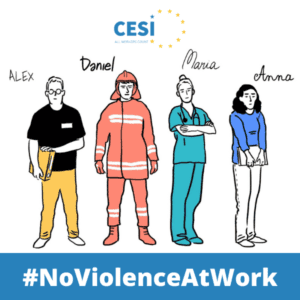2021-03-02 10:28
CESI successfully concluded its two-year project on third-party violence at work, and despite the pandemic having influenced the activities in the last project’s phase, the initially planned deliverables were submitted to the European Commission.
The beginning of March will also mark the start of a new joint project on the role of social partners in preventing third-party violence and harassment at work. This project is led by EPSU, with CEMR, CESI and HOSPEEM and as co-leaders.
 CESI’s project “Trade unions for zero tolerance towards third-party violence at work: Let’s protect public sector workers in Europe!”was conceived as a series of actions meant to continue the work carried out by the European social partners in the area of third-party violence and to step up the European debate through a document of recommendations called the #NOVIOLENCEATWORK Manifesto.
CESI’s project “Trade unions for zero tolerance towards third-party violence at work: Let’s protect public sector workers in Europe!”was conceived as a series of actions meant to continue the work carried out by the European social partners in the area of third-party violence and to step up the European debate through a document of recommendations called the #NOVIOLENCEATWORK Manifesto.
The aim has been to ensure the full recognition and awareness of the specific nature of the phenomenon, as well as its impact on the working conditions of employees. Trade unions need the capacities and knowledge to fully address the issue, to protect workers from external violence, and to accompany victims of violence, either in legal proceedings or with psychological and/or practical assistance.
As many CESI members had been working on the topic at national level through own awareness-raising campaigns or other good practices, CESI’s project contributed to support them by adding a European dimension.
The project, chiefly financed by European Union’s funds, led to an awareness-raising campaign by CESI through an animated video entitled “Independent trade-unions gather for zero tolerance against violence. Let’s end third-party violence at work.”
This campaign was launched in 2020 – which also marked the 10th anniversary from the social partners’ multi-sectoral guidelines to tackle third-party violence and harassment related to work.
It appears that the COVID-19 pandemic has led to additional sources of stress to the work of public services, further challenging the prevention of violence in the workplace.
According to many testimonies, workers even in the healthcare sector (mostly considered at first as “heroes” in the fight against Covid-19) continued to be victims of external violence as a consequence of a rising social frustration and a changing society in which some forms of violence are simply and sadly trivialized.
The workforce in the education and security sectors have been particularly exposed to third party violence too. Recent reports confirm for instance that aggressions against the French police have more than doubled in twenty years.
The phenomenon of third-party violence against public sector workers, unfortunately, represents a deterrent against the attractiveness of several public sector professions and the recruitment of young people in these fields. This project has therefore ultimately shown the crucial role of trade-unions in revalorizing public workers and in raising awareness throughout the overall society, about the value of public services and public workers.
As Klaus Heeger, CESI Secretary General, concluded on the occasion of the final meeting: “We want to raise awareness to protect our members, to protect the victims. And we should not only do it as trade unions, but also as citizens. Because an attack against a nurse, a firefighter or a teacher is an attack against us all.”
Through its own #NOVIOLENCEATWORK campaign, as well as its participation in the joint social partners’ project on third-party violence, CESI is definitely committed to keep the spotlight on the topic in the years to come.


